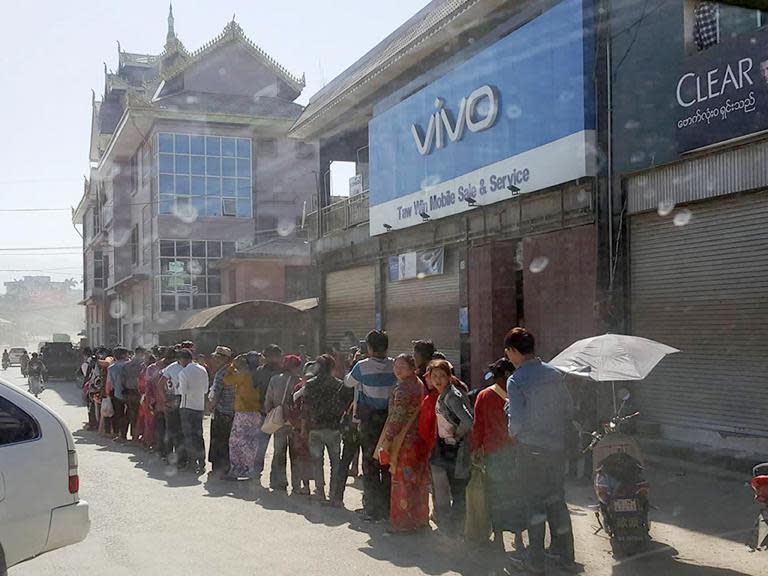Myanmar women trafficked as brides into sexual slavery in China, reveals harrowing report
China’s shortage of women is causing young women to be trafficked into the country from Myanmar as brides and raped until they become pregnant, a harrowing new report has found.
The Human Rights Watch report, called “Give Us a Baby and We’ll Let You Go: Trafficking of Kachin ‘Brides’ from Myanmar to China”, found vulnerable young women from Myanmar’s conflict-ravaged northern Kachin and Shan states are being trafficked into sexual slavery in China.
Family members and people they deemed to be trustworthy promised them jobs in China, but instead sold them for the equivalent of $3,000 (£2,300) to $13,000 to Chinese families, the 112-page report found.
In China, they were typically locked in a room and raped so they would become pregnant.
“Myanmar and Chinese authorities are looking away while unscrupulous traffickers are selling Kachin women and girls into captivity and unspeakable abuse,” Heather Barr, the author of the report, said.
“The dearth of livelihoods and basic rights protections have made these women easy prey for traffickers, who have little reason to fear law enforcement on either side of the border.”
The percentage of women in China’s population has dropped steadily since 1987 – with the gender gap among men and women aged 15 to 29 rising.
Researchers estimate China has 30 to 40 million “missing women” who would be alive today if it were not for the preference for boys aggravated by the country’s “one-child policy”.
The measure, which was in place from 1979 to 2015, saw the state aim to restrict the number of children that parents gave birth to in order to control the population. They also attribute this dearth of women to China’s continuing restrictions on women’s reproductive rights.
Previous research found the Asian country has 34 million more males than females. However, it found raising the birth rate could be tricky – with the number of Chinese women between the typically child-bearing ages of 20 and 39 expected to drop by more than 39 million over the next decade.
Some families deal with the shortage of marriageable women by buying trafficked women or girls. While it is difficult to estimate the total number of women and girls being trafficked as brides to China, the Myanmar government reported 226 cases in 2017.
However, experts on the issue told Human Rights Watch they consider the actual figure is most likely a great deal higher.
A Kachin woman, who spoke to researchers, said she had been trafficked at 16 by her sister-in-law.
“The family took me to a room,” she said. “In that room I was tied up again … They locked the door – for one or two months. When it was time for meals, they sent meals in. I was crying … Each time when the Chinese man brought me meals, he raped me.”
The report is predominantly based on interviews with 37 trafficking survivors, three families of victims, Myanmar government officials and police, and members of local groups, among others.
The report found law enforcement officers in China and Myanmar, including officials of the Kachin Independence Organisation, have made little effort to recover trafficked women and girls. Families pursuing police help were repeatedly rebuffed and often told that they would have to pay before police would take action.
Women and girls who contacted the Chinese police after escaping were sometimes jailed for immigration violations rather than being treated as victims of crimes.
“The Myanmar and Chinese governments, as well as the Kachin Independence Organisation, should be doing much more to prevent trafficking, recover and assist victims, and prosecute traffickers,” Ms Barr, acting women’s rights co-director at Human Rights Watch, said.
“Donors and international organisations should support the local groups that are doing the hard work that governments won’t to rescue trafficked women and girls and help them recover.”
Although the 37 women and girls interviewed had all escaped back to Myanmar, some are held as sex slaves for years. Others are faced with the painful predicament of being forced to leave their child behind if they want to go back to their families.
Many of the trafficking survivors researchers spoke to were among over 100,000 people internally displaced by fighting in Kachin and northern Shan states who face gruelling, desperate lives in camps.
Humanitarian aid to the camps has chiefly been blocked by the Myanmar government. Women are often the sole breadwinners due to men taking part in the conflict.
A study, carried out by the Johns Hopkins Bloomberg School of Public Health and Kachin Women’s Association Thailand at the end of last year, found thousands of vulnerable women and girls are being trafficked from Myanmar to China and forced to marry and bear children.
Marriages are often arranged and brokered by village elders, as well as the women’s own families, and women are left powerless to refuse because they are in the lower echelons of the social hierarchy.
The study, which was the first to quantify the extent of the problem and was carried out from June 2017 to April of last year, urged both Myanmar and China to provide training to border officials on anti-trafficking and safe migration measures.

 Yahoo News
Yahoo News 

